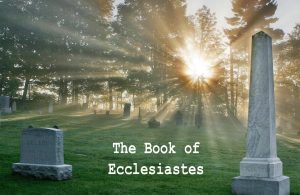The Watchtower cites several proof texts in support of its teaching that there is no conscious existence after death. Here is how to address them. (pp. 254-256) Continue reading
Tag: Ecclesiastes 1:2
 In last week’s post, I discussed how to respond to six words from Ecclesiastes 9:5, the Watchtower’s primary proof text for its teaching that the dead have no conscious existence until the resurrection: “… the dead know nothing at all…” (all quotes will be from the Watchtower’s own 2013 New World Translation)
In last week’s post, I discussed how to respond to six words from Ecclesiastes 9:5, the Watchtower’s primary proof text for its teaching that the dead have no conscious existence until the resurrection: “… the dead know nothing at all…” (all quotes will be from the Watchtower’s own 2013 New World Translation)
My recommendation was to have them read the rest of verse 5 and all of verse 6 to see if the passage expresses God’s viewpoint or merely the perspective of a man who is looking on this life as all there is: “… the dead know nothing at all, nor do they have any more reward, because all memory of them is forgotten. Also, their love and their hate and their jealousy have already perished, and they no longer have any share in what is done under the sun.”
I also suggested that you look at Ecclesiastes 1:2 and ask the same question with regard to the book of Ecclesiastes as a whole: “‘The greatest futility!’ says the congregator, ‘The greatest futility! Everything is futile!’”
Sometimes Witnesses will persist in ignoring the context and insist that “the dead know nothing at all” is truth revealed by God. If that happens, I recommend that you have them look at other passages in Ecclesiastes to see if they express Jehovah’s viewpoint. Here are several passages you can use for this purpose. Beware of overkill, though. Only use as many of them as necessary to make the point. Continue reading
Theme by Anders Noren — Up ↑
